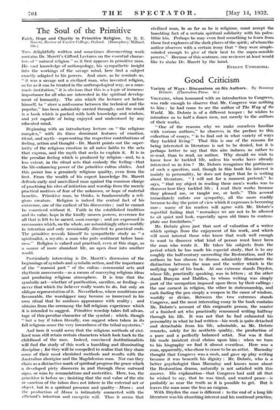The Soul of the Primitive
TUN delightfully written and sometimes disconcerting work contains Dr. Marett's Gifford Lectures on the essential charac- ters of" natural religion" as it first appears in primitive man. His vast knowledge of anthropology, his sympathetic insight into the workings of the savage mind, here find a subject exactly adapted to his powers. And since, as he reminds us, "it was a savage not a civilized man, who invented religion, so far as it can be treated in the anthropological way, as a man- made institution," it is obvious that this is a topic of immense importance for all who are interested in the spiritual develop- ment of humanity. The aim which the lecturer set before himself, to "steer a mid-course between the technical and the popular," has been admirably carried through ; and the result is a book which is packed with both knowledge and wisdom, and yet capable of being enjoyed and understood by any educated mind.
Beginning with an introductory lecture on "the religious complex," with its three dominant features of emotion, ritual, and myth—representing the respective contributions of feeling, action and thought—Dr. Marett points out the super- iority of the religious emotion in all naive faiths to the acts that express, and the myth that seeks to explain it. It is in the peculiar feeling which is produced by religion—and, to a less extent, in the ritual acts that embody the feeling—that the life-enhancing power of the primitive cultus abides. And this power has a genuinely religious quality, even from the first. From the wealth of his expert knowledge Dr. Marett defends early and uncivilized man against the common charge of practising his rites of initiation and worship from the merely practical motives of fear of the unknown, or hope of material benefits. Primitive man, he thinks, is fundamentally a reli- gious creature. Religion is indeed the central fact of his existence, one of the earliest of his discoveries ; and he cannot be conceived without it. Faith in the established tradition and its value, hope in the kindly unseen powers, reverence for all that is felt to be sacred, soon emerge ; and arc expressed in ceremonies which, on the whole, are astonishingly other-worldly in intention anti only occasionally directed to practical ends. The primitive reveals himself to sympathetic study as "a spiritualist, a mystic, a man who puts sentiment before busi- ness.- Religion is valued and practised, even at this stage, as a source of more abundant life, an open door into another world.
Particularly interesting is Dr. Marett's discussion of the beginnings of symbols and symbolic action, and the importance of the "'manual part" of the cultus—ceremonial acts and rhythmic movements—as a means of conveying religious ideas and producing religious atmosphere. It is true that the Symbolic act—whether of purification, sacrifice, or feeding—is never that which the believer really wants to do, but only an oblique representation of it. Nevertheless, where conditions are favourable, the worshipper may become so inunersed in his own ritual that he confuses appearance with reality ; and obtains from the ceremony the full religious experience which it is intended to suggest. Primitive worship takes full advan. tage of this peculiar character of the symbol ; which, though "but a toy if taken literally, can suggest when taken in its full religious sense the very inwardness of the tribal mysteries."
And here it would seem that the religious methods of civi- lized man still retain certain characters which look back to the childhood of the race. Indeed, convinced institutionalists will find the study of this work a humbling and illuminating discipline ; for they will be compelled to realize that they share some of their most cherished methods and results with the Australian aborigine and the Magdalenian man. Nor can they Claim as a distinctive mark of spiritual progress the grace which a developed piety discovers in and through these outward signs, or wins by renunciations and austerities. Here, too, the p • 'tire is before us ; insisting that the real value of the rite or sanction of the taboo does not inhere in the external act or object, but in a spiritual presence and quality—Mena ; and the production of Mana is intimately connected with the OfficianCs intention and energetic will. Thus it seems that civilized man, in so far as he is religious, must accept the humbling fact of a certain spiritual solidarity with his paleo- lithic kin. Perhaps he may even find something to learn front those first explorers of the dark places of the spirit; of whom the author observes with a certain irony that "they were simple- minded enough to give of their best to the supra-sensible powers." Because of this sentence, one reviewer at least would like to shake Dr. Marett by the hand.
EVELYN UNDERIIRS.




































 Previous page
Previous page